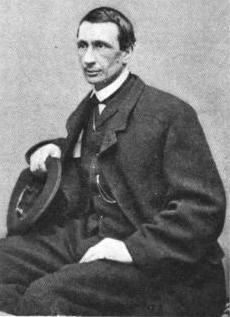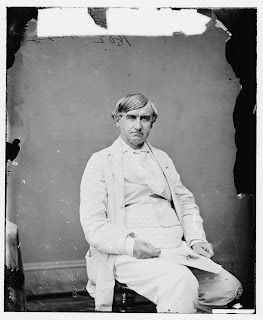Chapter One Hundred and Fifty Five
A Nation United in Foolishness
From “America in Abyssinia – a reassessment” by Dr. Luther K. Price
Buffalo 1991
“Had Russell’s diplomatic cable, communicated directly to Secretary Seward by Lord Lyons, been the only notification of British intentions in Abyssinia then perhaps the involvement of the United States would never have advanced beyond purely moral support. However preparations for the expedition were widely reported in the press and privately detailed to a number of leading Americans by their British correspondents, among them Philip Kearny and John Watts de Peyster…
Earlier historians of this period of ‘American Adventurism’ put the pressure brought to bear by the army at the feet of General Kearny. It is much more likely that it was de Peyster influencing Kearny to support his policy, for that is what the Abyssinia Expedition represented – the earliest expression of de Peyster’s ‘Military Policy’. The expedition could be used as a solution to certain domestic embarrassments while increasing the influence of the United States on a global stage...”
"The Reconstruction Era" by Michael Baylor
Grosvenor 2006
“The Nation had, at the prompting of Reverend Crummell, taken up the cause of Hezekiah H. Hunter. That his predicament would gain the attention of the old abolitionist and new negro press was not surprising. What changed the nature of the story was what happened when the national press began reporting on Hunter…
The Nation, successor of William Lloyd Garrison's "The Liberator".
John J. Peck, Oliver O. Howard and Isaac P. Rodman were at the forefront of calls for action to ensure the safe release of Hunter, a veteran of Peck’s Fighting Lambs. Peck tapped into a great seam of national guilt when he wrote “
the nation has allowed one Hunter to be martyred for our sins. Let not another be martyred because of our neglect” (a letter from Peck to Frederick Douglass published in part first in The Nation). He of course referred to the national hero General David Hunter, executed during the Civil War by Confederates because of his support for emancipation and the arming of former slaves…
Yet it was not the Republican press that lobbied hardest for military action. To the continued surprise of many it was the Democratic press who rattled their sabres hardest. Scores of headlines and editorials declared Theodore’s actions an insult to national prestige. “
The petty despot of Abyssinia needs to be taught the consequences of thumbing his nose at the American people” thundered Wilbur F. Storey of the Chicago Times “
just as the Barbary Pirates were in the time of our fathers”…
Wilbur F. Storey of the Chicago Times and perennial opponent of President Lincoln
The louder the Democratic press cried insult, the deeper they buried their former equivocation on American patriotism. Many considered it a cheap remedy to the national suspicion of Democratic loyalty. “
It is not as though Lincoln and Seward will waste one cent to recover a negro preacher from the bowels of Africa” as Marcus Pomeroy of the La Crosse Democrat privately noted to a friend. For those more optimistic that action might be taken "
every soldier not in the South is one fewer soldier I have to fear" as John Chilton of Savannah Gazette observed when commenting on the constant fear many southerners had of denunciation, followed by de-naturalisation or expatriation. The cries from the Democratic press were so loud John Sedgwick observed "
every spinner in Virginia is in favor of the army punishing the one negro they can all publicly hate, Theodore of Abyssinia"..."
From "Seward's Follies - A Re-examination of the policies of Secretary William Seward" by Dr. John Hobson
Harvard 2012
“In the face of pressure from left and right Seward found himself helpless. It was not as though there was an Abyssinian ambassador or consul with whom he could lodge a protest or open negotiations. Britain, with all its interests and experience in the region, itself had no diplomatic options. “
What prey do you scribblers expect the government to do?” (Seward to his friend, retired newspaper editor Thurlow Weed)...”
From “The Rivals – Lincoln and his Cabinet” by Amelia Doggett
Grosvenor 2008
“The future policies of John Watts de Peyster ought not to be a subject of this work except that in the final years of the Lincoln administration they were already bleeding into the national debate. Kearny’s memorandum to Lincoln and Stanton on “the consideration of a military contribution to the British Expedition currently planned for Abyssinia” was neither solicited nor initially welcomed. Yet in it were the seeds of its success. The proposition that General Winfield Scott Hancock command any expedition would remove a potential political embarrassment from North Carolina (and Democratic speculation about his potential presidential candidacy) while placing one of the nation’s finest soldiers in a role well suited to his abilities. It had de Peyster’s fingerprints and indeed he was fervently in favour of the military/diplomatic adventure and said so loudly and often within his New York circle (at least according to the memoirs of his friend Robert B. Roosevelt, then National Unionist candidate for congress)…
John Watts de Peyster
A critical figure in the development of US foreign and military policy in the second half of the 19th Century
With pressure from both flanks of the press and Congress, Lincoln began to discuss military action in cabinet seriously. Stanton was pessimistic. Troops, he said, were badly needed to police the South, Indian Country, and the Mexican border. The army did still have ample stocks of war material but he was seriously concerned about the War Office’s ability to supply any troops in Abyssinia. Welles thought the whole concept a “
colossal waste of time and money...surely Teddy (as a large portion of the American press had taken to calling Emperor Theodore)
would kill all his captives at the first hint of an invasion”. He could easily ship a few thousand troops as far as Alexandria or the Sinai, but private means would have to be found to get them to Annesly Bay via the Red Sea. On the subject of supply he was clear – American agents would have to compete with the British ‘in theatre’ to secure supplies of food and forage where necessary. Seward, barely taking the discussion seriously (at least as far as Holt later observed), believed American consuls in Egypt and India could be trusted to act as agents to secure such supplies as were necessary if the funds were supplied.
Vice President Joseph Holt
Unlike Hannibal Hamblin before him, he regularly attended cabinet
McCullough was horrified that the discussion was even taking place. Though only in office a few weeks at this point he had inherited Chase’s pessimism about the state of the nation’s finances if caution and restraint were not exercised. No one, not even Kearny, seemed able to estimate the likely cost of such an expedition and no one had any idea of the cost of the basic supplies any force would need to secure whether in Egypt, Arabia or India. Holt thought McCulloch need not worry as disease would kill most soldiers in a few weeks and the rest would disappear in the African wilderness never to be heard from again. That said, Holt declared that any such expedition would be, at least initially, hugely popular and unusually placate both Radicals and Democrats…
“
Gentlemen,” Lincoln observed “
the Radicals want it; the Democrats want it; the Freedmen want it; the Press want it; the Army wants it; and the nation’s clergy want it. Can I, can any government, afford to disappoint so many people?”
“
Well if it succeeds it will unite the country” observed Seward “
and if it fails it will likely be someone else’s problem by then”…
Thus Seward was authorised to open discussions with the British Government, via Lord Lyons, to discuss the dispatch of a small force, no more than brigade strength, to support the proposed campaign in Abyssinia. Seward had however secured from the President permission to impose a number of preconditions to American involvement. Specifically any nation involved (France had not yet demurred) would not seek territorial concessions from the Abyssinian peoples nor would any financial indemnity be imposed unless the prisoners were killed. As far as Seward was concerned it was still by no means clear that a force would be sent, yet he had not realised that the wheels had inexorably been set in motion...”
Little did the British minister to the United States, Lord Lyons, expect to receive a positive, albeit conditional, response to the invitation to join any Abyssinian military expedition




